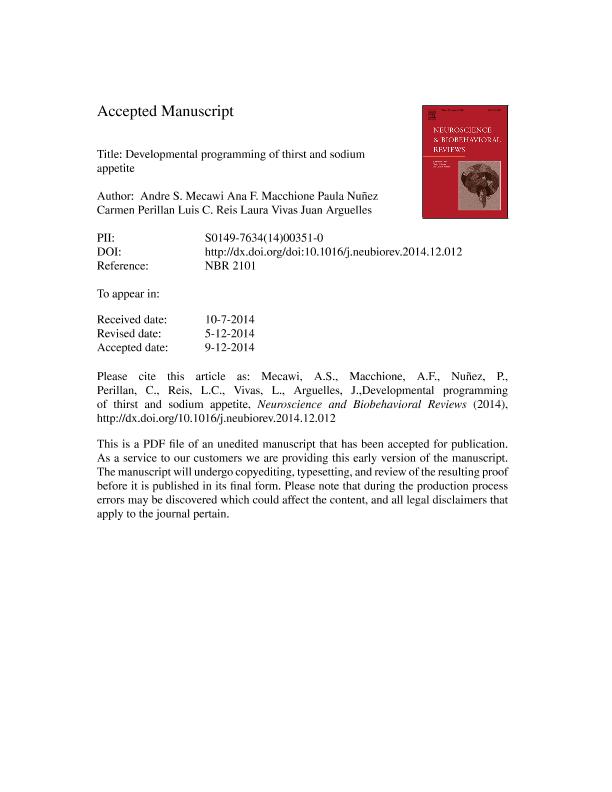Artículo
Developmental programing of thirst and sodium appetite
Mecawi, Andre S.; Macchione, Ana Fabiola ; Nuñez, Paula; Perillan, Carmen; Reis, Luis C.; Vivas, Laura Marta
; Nuñez, Paula; Perillan, Carmen; Reis, Luis C.; Vivas, Laura Marta ; Arguelles, Juan
; Arguelles, Juan
 ; Nuñez, Paula; Perillan, Carmen; Reis, Luis C.; Vivas, Laura Marta
; Nuñez, Paula; Perillan, Carmen; Reis, Luis C.; Vivas, Laura Marta ; Arguelles, Juan
; Arguelles, Juan
Fecha de publicación:
04/2015
Editorial:
Pergamon-Elsevier Science Ltd
Revista:
Neuroscience and Biobehavioral Reviews
ISSN:
0149-7634
Idioma:
Inglés
Tipo de recurso:
Artículo publicado
Clasificación temática:
Resumen
Thirst and sodium appetite are the sensations responsible for the motivated behaviors of water and salt intake, respectively, and both are essential responses for the maintenance of hydromineral homeostasis in animals. These sensations and their related behaviors develop very early in the postnatal period in animals. Many studies have demonstrated several pre- and postnatal stimuli that are responsible for the developmental programing of thirst and sodium appetite and, consequently, the pattern of water and salt intake in adulthood in need-free or need-induced conditions. The literature systematically reports the involvement of dietary changes, hydromineral and cardiovascular challenges, renin-angiotensin system and steroid hormone disturbances, and lifestyle in these developmental factors. Therefore, this review will address how pre- and postnatal challenges can program lifelong thirst and sodium appetite in animals and humans, as well as which neuroendocrine substrates are involved. In addition, the possible epigenetic molecular mechanisms responsible for the developmental programing of drinking behavior, the clinical implications of hydromineral disturbances during pre- and postnatal periods, and the developmental origins of adult hydromineral behavior will be discussed.
Archivos asociados
Licencia
Identificadores
Colecciones
Articulos(INIBIBB)
Articulos de INST.DE INVEST.BIOQUIMICAS BAHIA BLANCA (I)
Articulos de INST.DE INVEST.BIOQUIMICAS BAHIA BLANCA (I)
Citación
Mecawi, Andre S.; Macchione, Ana Fabiola; Nuñez, Paula; Perillan, Carmen; Reis, Luis C.; et al.; Developmental programing of thirst and sodium appetite; Pergamon-Elsevier Science Ltd; Neuroscience and Biobehavioral Reviews; 51; 4-2015; 1-14
Compartir
Altmétricas



